The seventeenth of January will mark 126 years of the United States’ belligerent occupation of the Hawaiian Kingdom. This outcome was initiated by “acts of war” committed by U.S. forces when the U.S. diplomat ordered an invasion on January 16, 1893, which led to the unlawful overthrow of the Hawaiian Kingdom government on January 17th.[1] President Grover Cleveland, in his manifesto to the Congress on December 18, 1893, acknowledged that a “substantial wrong has thus been done which a due regard for our national character as well as the rights of the injured people requires we should endeavor to repair.”[2]
Instead of restoring the Hawaiian government under Queen Lili‘uokalani and repairing the “rights of the injured people,” the United States embarked on a history of deception, lies, the establishment of 118 military installations, and international crimes committed against civilians within Hawaiian territory. These injustices led to the restoration of the Hawaiian government, in situ, in 1995, in similar fashion to the formation of governments in exile during World War II under the doctrine of necessity, and to the Larsen v. Hawaiian Kingdom arbitration, which sought to address the rights of one of those “injured people,” Lance Paul Larsen, a Hawaiian subject. Mr. Larsen was subjected to an unfair trial, unlawful confinement and pillaging by the State of Hawai‘i. These are violations of the 1907 Hague Convention, IV, and the 1949 Geneva Convention, IV, which are considered war crimes.
Lance Paul Larsen v. the Hawaiian Kingdom
The dispute centered on the allegation by Mr. Larsen that the Hawaiian government was liable for “allowing the unlawful imposition of American municipal laws over [him] within the territorial jurisdiction of the Hawaiian Kingdom.” What Mr. Larsen had to overcome was whether he could proceed to hold the Hawaiian government liable for the violation of his rights without the participation of the United States who was the entity that allegedly violated his rights.
On March 3, 2000, a meeting was held in Washington, D.C., with Mr. John Crook from the U.S. State Department, Dr. Sai as Agent for the Hawaiian government, and Ms. Ninia Parks, counsel for Mr. Larsen, where the United States was formally invited to join in the arbitration. A few weeks later, the United States notified the Permanent Court of Arbitration (“PCA”) that it will not join in the proceedings but they asked permission from the Hawaiian government and Mr. Larsen if it could have access to all pleadings and records of the case. Permission was granted. For Mr. Larsen, this gave rise to the indispensable third-party rule and whether or not he could proceed against the Hawaiian government without the participation of the United States. Unlike national courts, international courts do not have subpoena powers.
The Larsen Tribunal eventually ruled that the United States was an indispensable third-party, and without its participation in the proceedings, the Tribunal could not determine what rights of Mr. Larsen were violated by the United States in order to hold the Hawaiian government accountable for the violation of those rights. The Tribunal, however, did state in its decision that the parties could pursue fact-finding through a commission of inquiry under the jurisdiction of the PCA whenever it may enter into an agreement to do so. Fact-finding is not affected by the indispensable third-party rule, which operates in similar fashion to a United States grand jury.
After the last day of the Larsen hearings were held at the PCA on December 11, 2000, the Council, was called to an urgent meeting by Dr. Jacques Bihozagara, Ambassador for the Republic of Rwanda assigned to Belgium. Ambassador Bihozagara had been attending a hearing before the International Court of Justice on December 8, 2000, (Democratic Republic of the Congo v. Belgium), where he became aware of the Hawaiian arbitration case at the PCA.
The following day, the Council, which included Dr. Sai, as Agent, and two Deputy Agents, Peter Umialiloa Sai, acting Minister of Foreign Affairs, and Mrs. Kau‘i P. Sai-Dudoit, formerly known as Kau‘i P. Goodhue, acting Minister of Finance, met with Ambassador Bihozagara in Brussels, Belgium.[3] In that meeting, Ambassador Bihozagara explained, that since he accessed the pleadings and records of the Larsen case on December 8, he had been in communication with his government. This prompted the meeting where he conveyed to Dr. Sai, as Chairman of the Council and agent in the Larsen case, that his government was prepared to bring to the attention of the United Nations General Assembly the prolonged occupation of the Hawaiian Kingdom by the United States.
After careful deliberation, the Council decided that it could not, in good conscience, accept this offer. The Council felt the timing was premature because Hawai‘i’s population remained ignorant of Hawai‘i’s profound legal position due to institutionalized denationalization—Americanization by the United States. Therefore, on behalf of the Council, Dr. Sai graciously thanked Ambassador Bihozagara for his government’s offer but stated that the Council first needed to address over a century of this denationalization. After an exchange of salutations, the meeting came to an end, and the Council returned that afternoon to The Hague.
Exposure of the Continuity of the Hawaiian Kingdom through the medium of Education
The decision by the Council to forego Ambassador Bihozagara’s invitation was made in line with section 495—Remedies of Injured Belligerent, United States Army FM-27-10, which states, “In the event of violation of the law of war, the injured party may legally resort to remedial action of the following types: a. Publication of the facts, with a view to influencing public opinion against the offending belligerent.”[4] Publication of the facts was the means the Council would focus its attention on to expose the prolonged occupation of the Hawaiian Kingdom and the circumstances of the Larsen case.
“When a well packaged web of lies has been sold to the masses over generations, the truth will seem utterly preposterous, and its speaker, a raving lunatic.” -Donald James Wheal
The belligerent occupation of the Hawaiian Kingdom by the United States rests squarely within the regime of the law of occupation in international humanitarian law. The application of the regime of occupation law “does not depend on a decision taken by an international authority”,[5] and “the existence of an armed conflict is an objective test and not a national ‘decision.’”[6] According to Article 42 of the 1907 Hague Convention, IV, a State’s territory is considered occupied when it is “actually placed under the authority of the hostile army.”
Article 42 has three requisite elements: (1) the presence of a foreign State’s forces; (2) the exercise of authority over the occupied territories by the foreign State or its proxy; and (3) the non-consent by the occupied State. U.S. President Grover Cleveland’s aforementioned manifesto to the Congress, which is Annexure 1 in the Larsen v. Hawaiian Kingdom Award, and the continued U.S. presence today without a treaty of peace firmly meets all three elements of Article 42. Hawai‘i’s people, however, have become denationalized and the history of the Hawaiian Kingdom has been, for all intents and purposes, obliterated since the United States’ takeover.
The Council needed to explain to Hawai‘i’s people that before the Permanent Court of Arbitration (“PCA”) could facilitate the formation of the Larsen tribunal the PCA had to ensure that it possessed “institutional jurisdiction.”[7] This jurisdiction required that the Hawaiian Kingdom be an existing “State.” This finding authorized the Hawaiian Kingdom’s access to the PCA pursuant to Article 47 of the 1907 Hague Convention for the Pacific Settlement of International Disputes, as a non-Contracting Power to the convention.
The PCA accepted the Larsen case as a dispute between a “State” and “private entity” and, in its annual reports from 2001 to 2011, acknowledged the Hawaiian Kingdom as a non-Contracting Power under Article 47 of the 1907 Hague Convention for the Pacific Settlement of International Disputes. For Hawai‘i’s people, this acknowledgement is significant on two levels, first, the Hawaiian Kingdom had to exist as a State under international law, otherwise the PCA would not have accepted the dispute to be settled through international arbitration, and, second, the PCA explicitly recognized the Hawaiian Kingdom as a non-Contracting Power (State) to the 1907 Hague Convention, I. A non-Contracting Power is a State that is not a signatory to the Convention.
To accomplish this educational goal, it was decided by the Council that Dr. Sai enter the University of Hawai‘i at Manoa political science department and secure an M.A. degree specializing in international relations, and then a Ph.D. with focus on the continuity of the Hawaiian Kingdom as an independent and sovereign State that has been under a prolonged occupation. From the University of Hawai‘i political science department, Professor Neal Milner, Professor John Wilson, and Professor Katherina Hyer; from the University of Hawai‘i Hawaiian Studies department, Professor Jon Osorio; from the University of Hawai‘i William S. Richardson School of Law—Professor Aviam Soifer; and from the University of London, SOAS, Professor Matthew Craven, served as members of his doctoral committee.
The Council’s objective was to engage over a century of denationalization through the medium of academic research and publications, both peer review and law review. As a result, awareness of the Hawaiian Kingdom’s political status has grown exponentially with multiple master’s theses, doctoral dissertations, and publications being written on the subject. What the world knew, before the Larsen case was held from 1999-2001, was drastically transformed to now. This transformation was the result of academic research in spite of the continued American occupation. The “injured people” began to ask the right questions.
“If they can get you asking the wrong questions, they don’t have to worry about answers.” -Thomas Pynchon
This
scholarship prompted a well-known historian in Hawai‘i, Tom Coffman, to change the
subtitle of his book in 2009, which Duke University republished in 2016, from The Story of America’s Annexation of the
Nation of Hawai‘i to The History of
the American Occupation of Hawai‘i. Coffman explained:
I am compelled to add that the continued relevance of this book reflects a far-reaching political, moral and intellectual failure of the United States to recognize and deal with its takeover of Hawai‘i. In the book’s subtitle, the word Annexation has been replaced by the word Occupation, referring to America’s occupation of Hawai‘i. Where annexation connotes legality by mutual agreement, the act was not mutual and therefore not legal. Since by definition of international law there was no annexation, we are left with the word occupation.
In making this change, I have embraced the logical conclusion of my research into the events of 1893 to 1898 in Honolulu and Washington, D.C. I am prompted to take this step by a growing body of historical work by a new generation of Native Hawaiian scholars. Dr. Keanu Sai writes, ‘The challenge for…the fields of political science, history, and law is to distinguish between the rule of law and the politics of power.’ In the history of Hawai‘i, the might of the United States does not make it right.[8]
In 2016, Japan’s Seijo University’s Center for Glocal Studies published an article by Dennis Riches titled This is not America: The Acting Government of the Hawaiian Kingdom Goes Global with Legal Challenges to End Occupation. At the center of this article was the continuity of the Hawaiian Kingdom, the Council of Regency, and the commission war crimes. Riches, who is Canadian, wrote:
[The history of the Baltic States] is a close analog of Hawai‘i because the occupation by a superpower lasted over several decades through much of the same period of history. The restoration of the Baltic States illustrates that one cannot say too much time has passed, too much has changed, or a nation is gone forever once a stronger nation annexes it. The passage of time doesn’t erase sovereignty, but it does extend the time which the occupying power has to neglect its duties and commit a growing list of war crimes.
Additionally, school teachers, throughout the Hawaiian Islands, have also been made aware of the American occupation through course work at the University of Hawai‘i and they are teaching this material in the middle schools and the high schools. This exposure led the Hawai‘i State Teachers Association (“HSTA”), which represents public school teachers throughout Hawai‘i, to introduce a resolution—New Business Item 37, on July 4, 2017, at the annual assembly of the National Education Association (“NEA”) in Boston, Massachusetts. The NEA represents 3.2 million public school teachers, administrators, and faculty and administrators of universities throughout the United States. The resolution stated:
The NEA will publish an article that documents the illegal overthrow of the Hawaiian Monarchy in 1893, the prolonged illegal occupation of the United States in the Hawaiian Kingdom, and the harmful effects that this occupation has had on the Hawaiian people and resources of the land.
When the HSTA delegates in attendance returned to Hawai‘i, they asked Dr. Sai to write three articles for the NEA to publish: first, The Illegal Overthrow of the Hawaiian Kingdom Government (April 2, 2018); second, The U.S. Occupation of the Hawaiian Kingdom (October 1, 2018); and, third, The Impact of the U.S. Occupation on the Hawaiian People (October 13, 2018). Awareness of the Hawaiian Kingdom’s situation has reached countless classrooms across the United States. These publications by the NEA was the Council’s crowning jewel which stemmed from the Council’s decision to address denationalization after returning home from the PCA in 2000.
Russian Government Admits Hawai‘i was Illegally Annexed
This
exposure also prompted the Russian government, on October 4, 2018, to admit
that Hawai‘i was illegally annexed by the United States. This acknowledgement occurred
at a seminar entitled “Russian America: Hawaiian Pages 200 Years After” held at
the PIR-CENTER, Institute of Contemporary International Studies, Diplomatic
Academy of the Russian Foreign Ministry, in Moscow. The topic of the seminar
was the restoration of Fort Elizabeth, a Russian fort built on the island of
Kaua‘i in 1817.
Leading the seminar was Dr. Vladimir Orlov, director of the PIR-CENTER. Notable participants included Deputy Foreign Minister Sergej Ryabkov, Head of the Department of European Co-operation and specialist on nuclear and other disarmament negotiations, and Russian Ambassador to the United States, Anatoly Antonov. In his concluding remarks Dr. Orlov, who incidentally referred to the U.S. military installations at Barking Sands, mentioned as an aside and in a relatively low voice: “The annexation of Hawai‘i by the US was of course illegal and everyone knows it.”
United Nations Independent Expert on Hawai‘i’s Occupation
This educational exposure also prompted United Nations Independent Expert, Dr. Alfred M. deZayas, to send a communication, dated February 25, 2018, to members of the State of Hawai‘i Judiciary stating that the Hawaiian Kingdom is an occupied State and that the 1907 Hague Convention, IV, and the 1949 Geneva Convention, IV, must be complied with. In that communication, Dr. deZayas stated:
I have come to understand that the lawful political status of the Hawaiian Islands is that of a sovereign nation-state in continuity; but a nation-state that is under a strange form of occupation by the United States resulting from an illegal military occupation and a fraudulent annexation. As such, international laws (the Hague and Geneva Conventions) require that governance and legal matters within the occupied territory of the Hawaiian Islands must be administered by the application of the laws of the occupied state (in this case, the Hawaiian Kingdom), not the domestic laws of the occupier (the United States).
This
UN Independent Expert clearly stated the application of “the Hague and Geneva
Conventions” requires the administration of Hawaiian Kingdom law, not United
States law, in Hawaiian territory. This issue was at the center of the Larsen v. Hawaiian Kingdom arbitration
case. His characterization of a “strange occupation” is not a diminishment of
the law of occupation, but rather a consequence of not complying with the law
of occupation. This noncompliance has created the façade of an incorporated
territory of the United States called the State of Hawai‘i. The State of
Hawai‘i is a de facto proxy for the
United States and maintains effective control over Hawaiian territory. The War Report 2017 refers to such
entities as an armed non-state actor (ANSA) “operating in another state when
that support is so significant that the foreign state is deemed to have
‘overall control’ over the actions of the ANSA.”[9]
Between the years of 1893 to 1898, the Hawaiian Kingdom was occupied by an American proxy of insurgents. There is no treaty of peace between the Hawaiian Kingdom and the United States except for the unilateral annexation of the Hawaiian Islands by a joint resolution of Congress. Whether by proxy or not, the United States is the occupying State and “as the right of an occupant in occupied territory is merely a right of administration, he may [not] annex it, while the war continues.”[10] The ICRC Commentary on Article 47 also emphasize, “It will be well to note that the reference to annexation in this Article cannot be considered as implying recognition of this manner of acquiring sovereignty.”[11]
The “Occupying Power cannot…annex the occupied territory, even if it occupies the whole of the territory concerned. A decision on that point can only be reached in a peace treaty. This is a universally-recognized rule and is endorsed by jurists and confirmed by numerous rulings of international and national courts.”[12] Therefore, according to the ICRC, “an Occupying Power continues to be bound to apply the Convention as a whole even when, in disregard of the rules of international law, it claims to have annexed all or part of an occupied territory.”[13] In other words, since there is no treaty of peace between the Hawaiian Kingdom and the United States, there was no annexation.
To
understand what the UN Independent Expert called a “fraudulent annexation,” attention
is drawn to the floor of the Senate on July 4, 1898, where U.S. Senator William
Allen of Nebraska stated:
“The Constitution and the statutes are territorial in their operation; that is, they can not have any binding force or operation beyond the territorial limits of the government in which they are promulgated. In other words, the Constitution and statutes can not reach across the territorial boundaries of the United States into the territorial domain of another government and affect that government or persons or property therein.”[14]
Two years later, on February 28, 1900, during a debate on senate bill no. 222 that proposed the establishment of a U.S. government to be called the Territory of Hawai‘i, Senator Allen reiterated, “I utterly repudiate the power of Congress to annex the Hawaiian Islands by a joint resolution such as passed the Senate. It is ipso facto null and void.”[15] In response, Senator John Spooner of Wisconsin, a constitutional lawyer, dismissively remarked, “that is a political question, not subject to review by the courts.”[16] Senator Spooner explained, “The Hawaiian Islands were annexed to the United States by a joint resolution passed by Congress. I reassert…that that was a political question and it will never be reviewed by the Supreme Court or any other judicial tribunal.”[17]
Senator Spooner never argued that congressional laws have authority beyond United States territory. Instead, he said this issue would never see the light of day because United States courts would not review it due to the political question doctrine. What Senator Spooner meant was no matter how illegal the annexation was, the American courts will have to accept it because Congress did it. For an explanation of the evolution of the political question doctrine regarding Hawai‘i go to this link. This exchange between the two Senators is troubling, but it acknowledges the limitation of congressional laws and the political means by which to conceal an internationally wrongful act. The Territory of Hawai‘i is the predecessor of the State of Hawai‘i.
It
would take another ninety years before the U.S. Department of Justice addressed
this issue. In a 1988 legal opinion, the Office of Legal Counsel examined the
purported annexation of the Hawaiian Islands by a congressional joint
resolution. Douglas Kmiec, Acting Assistant Attorney General, authored this
opinion for Abraham D. Sofaer, legal advisor to the U.S. Department of State.
After covering the limitation of congressional authority, which, in effect,
confirmed the statements made by Senator Allen, Assistant Attorney General
Kmiec concluded:
Notwithstanding these constitutional objections, Congress approved the joint resolution and President McKinley signed the measure in 1898. Nevertheless, whether this action demonstrates the constitutional power of Congress to acquire territory is certainly questionable. … It is therefore unclear which constitutional power Congress exercised when it acquired Hawaii by joint resolution. Accordingly, it is doubtful that the acquisition of Hawaii can serve as an appropriate precedent for a congressional assertion of sovereignty over an extended territorial sea.[18]
War Crimes—Violations of the Hague and Geneva Conventions
All this education and exposure has motivated an elected official for the State of Hawai‘i, while still in office, to take steps to conform to the 1907 Hague Convention, IV, and the 1949 Geneva Convention, IV. Her story was published by the British news outlet The Guardian, titled Hawai‘i politician stops voting, claiming islands are ‘occupied sovereign country.’ Other public officials of the State of Hawai‘i have also become aware of the American occupation and are taking steps to conform with international humanitarian law. They have reached out to Dr. Sai for consultation.
Moreover, on October 11, 2018, the Federal Bureau of Investigation was sent a letter, from Jennifer Ruggles, the aforementioned State of Hawai‘i public official, reporting war crimes committed by the Queen’s Hospital, in violation of 18 U.S.C. §2441 and §1091, and war crimes committed by thirty-two Circuit Judges of the State of Hawai‘i, in violation of 18 U.S.C. §2441.[19] Thereafter, Ms. Ruggles reported additional war crimes of pillaging committed by State of Hawai‘i tax collectors, in violation of §2441,[20] the war crime of unlawful appropriation of property by the President of the United States and the Internal Revenue Service, in violation of §2441,[21] and the war crime of destruction of property by the State of Hawai‘i on the summit of Mauna Kea, in violation of §2441.[22]
Naboth’s Vineyard
Within nearly two decades the Council has effectively changed the discourse of Hawai‘i politics and history from the façade of American colonization and the formation of the State of Hawai‘i to the continued existence of the Hawaiian Kingdom as a sovereign and independent State that has and continues to be under an illegal and prolonged occupation by the United States.
As we are entering over a century of non-compliance with the law of occupation and the commission of war crimes, accountability for these war crimes is just over the horizon. In her last chapter titled “Hawaiian Autonomy” of her 1898 autobiography, Hawai‘i’s Story by Hawai‘i’s Queen, Queen Lili‘uokalani warned:
Oh, honest Americans, as Christians, hear me for my down trodden people! Their form of government is as dear to them as yours is precious to you. Quite as warmly as you love your country, so they love theirs. With all your goodly possessions, covering a territory so immense that there yet remain parts unexplored, possessing islands that, although near at hand, had to be neutral ground in time of war, do not covet the little vineyard of Naboth’s so far from your shores, lest the punishment of Ahab fall upon you, if not in your day in that of your children, for “for be not deceived, God is not mocked.”
[1] Award (Larsen v.
Hawaiian Kingdom), Annexure 1, President
Cleveland’s message to the Senate and House of Representatives dated 18
December 1893, 119 ILR (2001), 566, 608.
[2] Id.
[3] David Keanu Sai, A Slippery Path
towards Hawaiian Indigeneity, 10 J.
L. & Soc. Challenges 69, 130-131 (2008).
[4] “United States Basic Field Manual F.M. 27-10 (Rules
of Land Warfare), though not a source of law like a statute, prerogative order
or decision of a court, is a very authoritative publication.” Trial of Sergeant-Major Shigeru Ohashi and
Six Others, 5 Law Reports of Trials of
Law Criminals (United Nations War Crime Commission) 27 (1949).
[5] C. Ryngaert and R. Fransen, “EU extraterritorial
obligations with respect to trade with occupied territories: Reflections after
the case of Front Polisario before EU courts,” [2018] 2(1): 7. Europe and the World:
A law review [20], p. 8. (online at https://www.scienceopen.com/document_file/e5cc1ac6-41ee-40de-bbe9-25c9df97ab1e/ScienceOpen/EWLR-2-7.pdf).
[6] Stuart Casey-Maslen (ed.), The War Report 2012 ix (2013).
[7] United Nations, United
Nations Conference on Trade and Development: Dispute Settlement (United
Nations New York and Geneva, 2003), at 15.
[8] Tom Coffman, Nation
Within: The History of the American Occupation of Hawai‘i xvi (2016).
[9] The War Report
2017, 22.
[10] Oppenheim, International
Law, vol. II, 6th ed., 237 (1921).
[11] International Committee of Red Cross, Commentary: IV Geneva Convention Relative to
the Protection of Civilian Persons in Time of War 276 (1958).
[12] Id., 275.
[13] Id., 276.
[14] 31 Cong. Rec. 6635 (1898).
[15] 33 Cong. Rec. 2391 (1900).
[16] Id.
[17] Id.
[18] 12 Opinions of the Office of Legal Counsel 238, 252
(1988) (online at https://hawaiiankingdom.org/pdf/1988_Opinion_OLC.pdf).
[19] Letter from Jennifer Ruggles, Hawai‘i County Council
member, State of Hawai‘i, to Sean Kaul, FBI Special Agent in Charge (11 Oct.
2018) (online at https://jenruggles.com/wp-content/uploads/Reporting_to_FBI_10.11.18.pdf).
[20] Letter from Jennifer Ruggles, Hawai‘i County
Council member, State of Hawai‘i, to State of Hawai‘i officials regarding
unlawful collection of taxes (15 Nov. 2018) (online at https://jenruggles.com/wp-content/uploads/Ltr-to-State-of-HI-re-Taxes.pdf).
[21] Letter from Jennifer Ruggles, Hawai‘i County Council
member, State of Hawai‘i, to U.S. President Trump regarding unlawful
appropriation of property (28 Nov. 2018) (online at https://jenruggles.com/wp-content/uploads/Ltr_to_President_Trump.pdf).
[22] Letter from Jennifer Ruggles, Hawai‘i County Council
member, State of Hawai‘i, to State of Hawai‘i Governor Ige and Supreme Court
Justices regarding unlawful destruction of property on the summit of Mauna Kea
(3 Dec. 2018) (online at https://jenruggles.com/wp-content/uploads/Ltr-to-Gov.-and-Sup.-Ct.pdf).

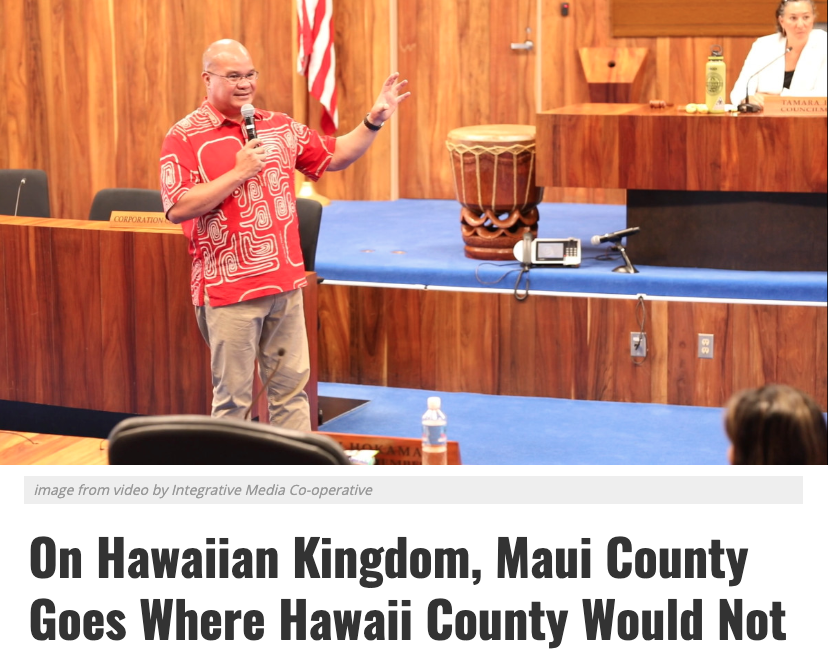
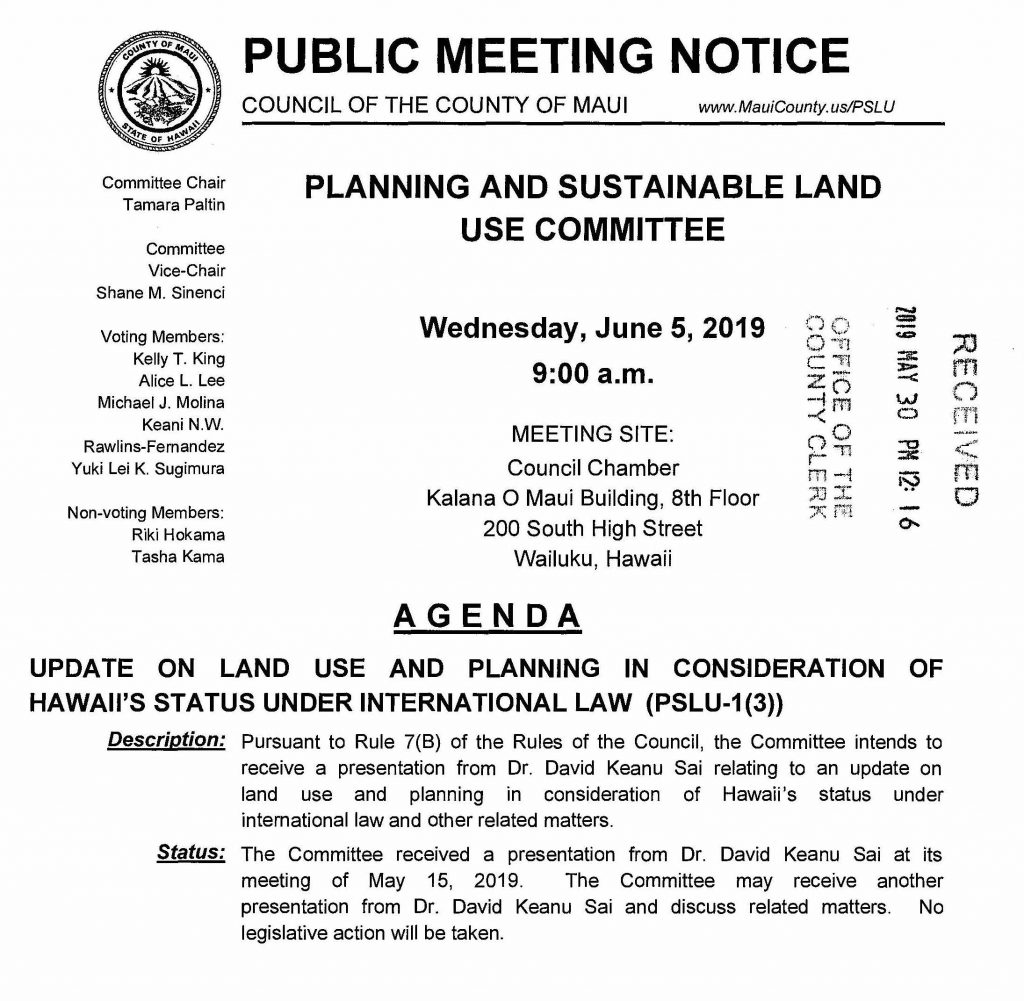
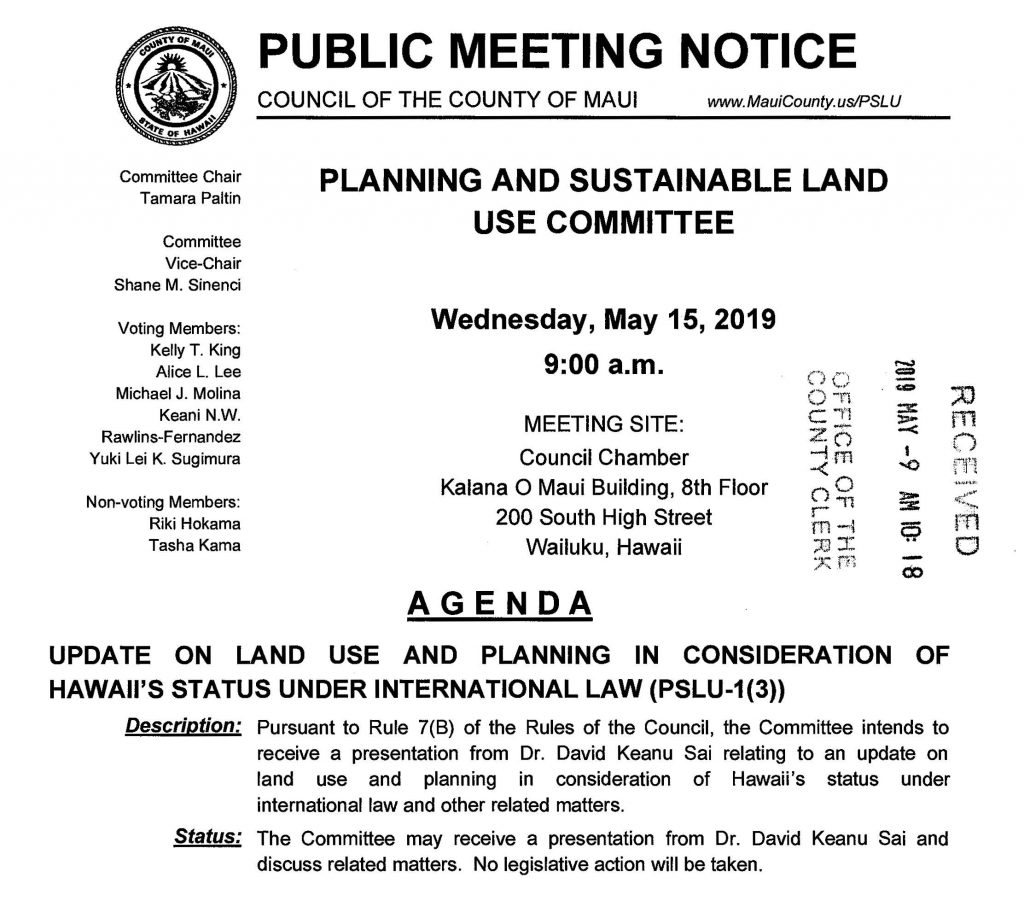
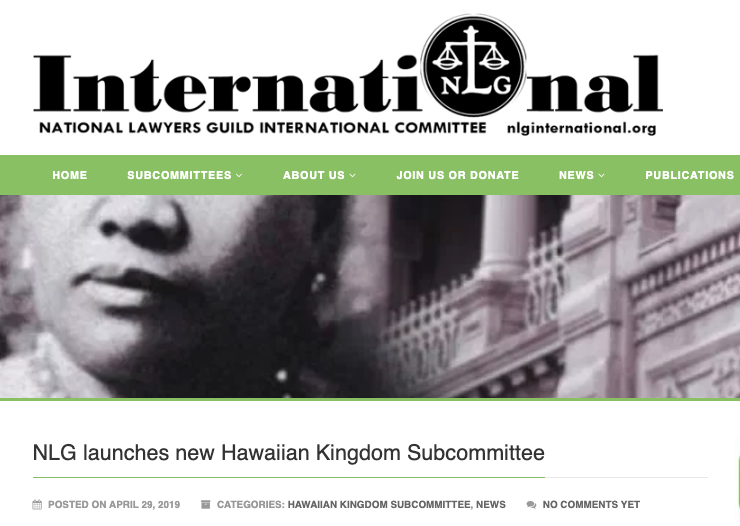
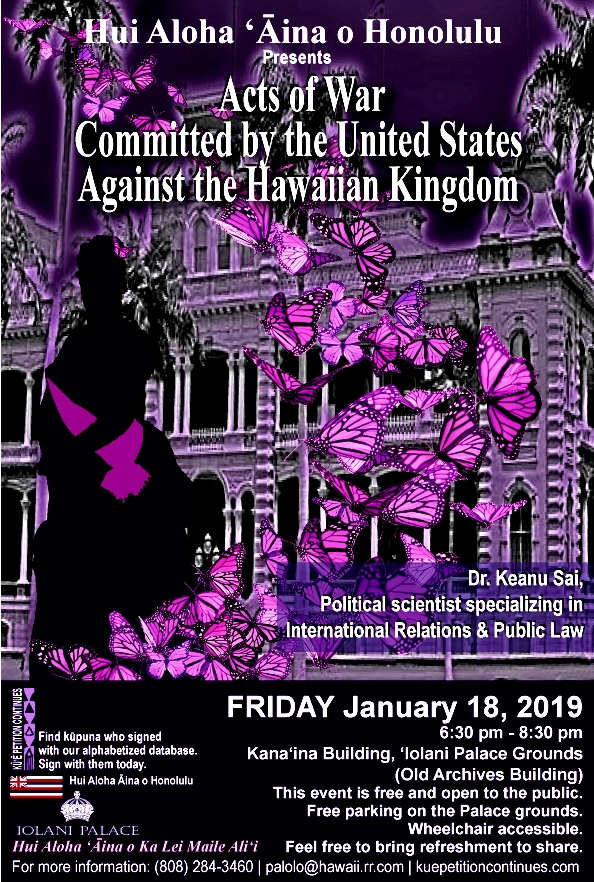
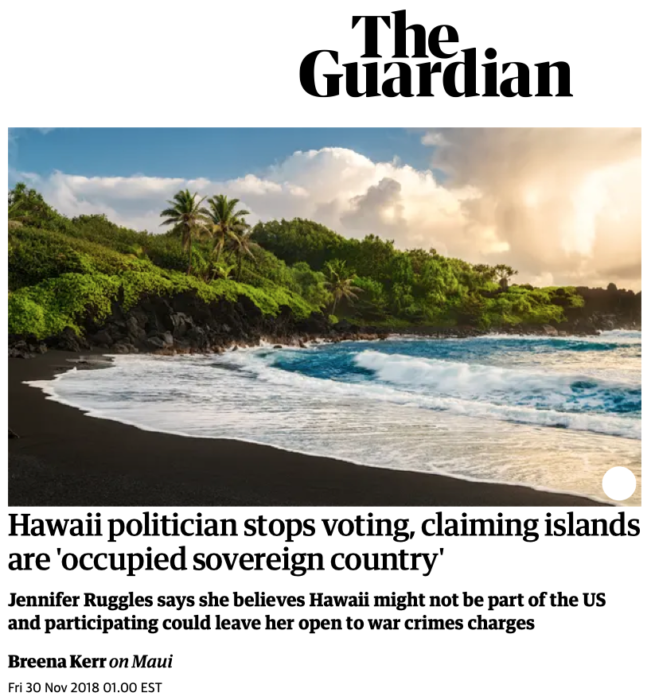
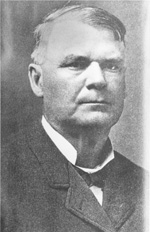 During the debate on July 4, 1898, Senator Allen said, “The Constitution and the statutes are territorial in their operation; that is, they can not have any binding force or operation beyond the territorial limits of the government in which they are promulgated. In other words, the Constitution and statutes can not reach across the territorial boundaries of the United States into the territorial domain of another government and affect that government or persons or property therein (31 Cong. Rec. 6635).”
During the debate on July 4, 1898, Senator Allen said, “The Constitution and the statutes are territorial in their operation; that is, they can not have any binding force or operation beyond the territorial limits of the government in which they are promulgated. In other words, the Constitution and statutes can not reach across the territorial boundaries of the United States into the territorial domain of another government and affect that government or persons or property therein (31 Cong. Rec. 6635).”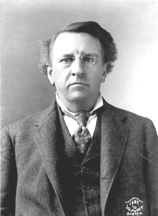 repudiate the power of Congress to annex the Hawaiian Islands by a joint resolution such as passed the Senate. It is ipso facto null and void (33 Cong. Rec. 2391).” If the annexation was null and void, then there would be no need to debate senate bill no. 222 that would establish an American government on Hawaiian territory. Senator Spooner response to Senator Allen was “that is a political question, not subject to review by the courts (id.).” He then reiterated, “The Hawaiian Islands were annexed to the United States by a joint resolution passed by Congress. I reassert…that that was a political question and it will never be reviewed by the Supreme Court or any other judicial tribunal (id.).”
repudiate the power of Congress to annex the Hawaiian Islands by a joint resolution such as passed the Senate. It is ipso facto null and void (33 Cong. Rec. 2391).” If the annexation was null and void, then there would be no need to debate senate bill no. 222 that would establish an American government on Hawaiian territory. Senator Spooner response to Senator Allen was “that is a political question, not subject to review by the courts (id.).” He then reiterated, “The Hawaiian Islands were annexed to the United States by a joint resolution passed by Congress. I reassert…that that was a political question and it will never be reviewed by the Supreme Court or any other judicial tribunal (id.).”